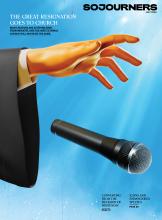THROUGHOUT THE PANDEMIC, church attendance has varied wildly. As precautions have fluctuated with every ebb and flow of the virus, congregants have had to balance their attendance with health concerns—and this balancing act has proven even more complicated for high risk and immunocompromised parishioners.
Government officials and political figures now encourage citizens to “live with COVID.” The faithful may be puzzled by still-empty pews. Where are our neighbors? Have they lost faith? Or do they still “live in fear”? These assumptions fail to consider a more troubling reality: Some neighbors are suffering from long-term illness resulting from COVID-19.
Though recent viral variants have been touted as mild, reports show that many people who tested positive for COVID-19 can struggle with ongoing health problems. This condition, called “long COVID,” affects one in three people who came down with the virus and had symptoms for months following the initial infection. A 2021 study shows that 57 percent of people who contracted COVID-19 were still experiencing symptoms up to six months after testing positive—including cardiovascular issues, neurological problems, brain fog, muscle pain, and fatigue. For sufferers, long COVID is debilitating and life-altering.
Read the Full Article

